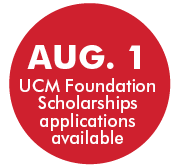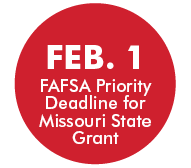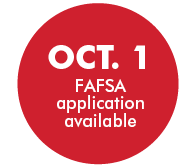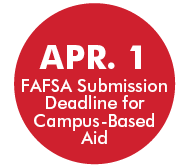Breadcrumb

Grants
| Tip | |
|
Add UCM’s code 002454 to your FAFSA application so we receive your information. |
 |
Grants are free sums of money for school which is typically based on financial need.
Completion of the Free Application for Federal Student Aid (FAFSA) is required in order to be considered for any type of federal or state grant, loan or award assistance.
Mule Grant
The Mule Grant awards first-time undergraduate degree-seeking students and transfer students with an associate degree who are residents in the state of Missouri the opportunity to attend UCM with less financial stress. Learn More Here ->
Federal Grants
Undergraduate
Pell Grant
Federal Pell Grant is a type of need-based gift aid, eligibility for which is based primarily on the income, asset and other data entered on the FAFSA . In accordance with federal financial aid regulations, Pell Grant assistance normally never needs to be repaid, and may be received only by undergraduate students who have the highest levels of calculated financial need and are pursuing their first bachelors degrees. The maximum award amount each year is established by the U.S. Department of Education and is based on national funding levels. The actual Pell Grant amount posted to a student's UCM account each semester is based on the exact number of undergraduate credit hours (s) he enrolls for. The following amounts are authorized for the 2021 fall, 2022 spring, and 2022 summer terms.
|
Enrollment Status |
|
2023-24 Maximum Pell Grant Award (per semester) |
|
12 or more hours |
Full-time |
$3,697 |
|
9-11 hours |
3/4-time |
$2,773 |
|
6-8 hours |
½-time |
$1,1849 |
|
1-5 hours |
Less than ½-time |
$ 924 |
Summer Pell Grant
You can receive an additional Pell Grant disbursement equal to a full semester amount (if in 12 hours) or half (if in 6 hours). If you are enrolled in less than 6 hours in the Summer, you can only use your remaining eligibility (if any) from 2022-2023. If enrolled in 6 hours or more, your awarded amount will be based on either your 2022-2023 FAFSA or 2023-2024 FAFSA, whichever is greater. The actual amount will be set at the time of awarding for the Summer. If the 2023-2024 FAFSA has not been filed, you will be awarded from the 2022-2023 FAFSA. This additional Pell Grant disbursement will count against your lifetime limit, consisting of a maximum of 12 semesters of 'full-time equivalent' Federal Pell Grant assistance.
For detailed information about the Federal Pell Grant program, visit Federal Student Aid.
Supplemental Educational Opportunity Grant (SEOG)
Federal SEOG is a type of need-based gift aid, the purpose of which is to supplement any Pell Grant assistance a student has been awarded. As with Pell Grant, SEOG funds normally never have to be repaid. If awarded, a student must normally enroll full-time (12 or more undergraduate credit hours) each fall or spring semester for the SEOG funds to credit his/her UCM account. Selection criteria includes:
1. Students who file the FAFSA by the priority deadline of April 1 each year.
2. Pell-eligible priority given to zero EFC students
3. Not exceeded Pell Lifetime Eligibility Limit (LEU)
4. Indicates interest in Federal Work Study on FAFSA ("Yes", or "don't know")
5. Not receiving more than $2,000 in gift aid. (helps us to further determine "need")
Award amounts range from $200 to $500 per semester. While funding is limited, we will try to re-award (as funding becomes available) to students who have demonstrated excesive need beyond the criteria above. For detailed information about the Federal SEOG program, visit the U.S. Department of Education.
TEACH Grant
The 2007 College Cost Reduction and Access Act created the Federal TEACH (Teacher Education Assistance for College and Higher Education) Grant program.
Frequently Asked Questions
What is the TEACH Grant Program?
Due to sequestration, the TEACH program provides a scheduled award of up to $3,772 per year (if first disbursed before 10/1/2023) to new and continuing undergraduate students who promise to teach full-time for at least 4 years in public or private elementary or secondary schools designated as serving students from low-income families (Title I).
Do I have to teach a certain subject?
Yes. You must agree to teach one or more of the designated 'teacher shortage/high need’ subject areas. Currently, these areas are mathematics, science, special education, bilingual education/English language acquisition, foreign language and Reading Specialist.
How do I know which schools are Title I?
Approved elementary and secondary schools which serve low-income students may be found by searching Teacher Cancellation Low Income Directory.
How much are TEACH Grants?
An eligible student pursuing a first bachelor degree, a post-baccalaureate teacher certification program, or a first masters degree, may receive a scheduled award of up to $3,772 if first disbursed before 10/1/2023. The maximum total grant that may be received for undergraduate and post-baccalaureate study is $16,000, or four scheduled awards. For graduate study, a total of $8,000, or two scheduled awards, in TEACH Grant funds may be received.
Can I receive a TEACH Grant for a summer session?
It depends. You may be considered for grant funds for a summer session if you didn't receive the full maximum annual award during the preceding fall and/or spring semesters.
How do I apply for a TEACH Grant?
To be considered for grant funding for the 2023 fall semester, 2024 spring semester and/or 2024 summer session, complete and submit the 2023/2024 Free Application for Federal Student Aid (FAFSA). In addition, be sure to print off, complete and submit the Federal TEACH Grant Request form.
Can I receive TEACH Grant aid to pursue a 2nd degree?
No. A student may not receive a TEACH Grant to pursue a second bachelors or second masters degree.
Do I have to sign an agreement to serve?
Yes. After submitting the TEACH Grant Request and being approved for the TEACH Grant aid, each year you are required to complete and sign the on-line Agreement to Serve. This agreement specifies the requirements that must be met as a condition of receiving the grant. Signing the agreement acknowledges your full understanding of these requirements.
What are the requirements?
You must promise to teach full-time in a ‘teacher-shortage/high-need’ subject area for at least four (4) academic years at a Title I-designated public or private elementary or secondary school within the eight (8) calendar years immediately following completion of the degree or certification program for which you received the TEACH Grant funds. Historically, the shortage regions for the State of Missouri are extremely limited. In order to fulfill your teaching obligations, you must teach in these locations. This list changes yearly and may be different at the time of your certification.
What happens if I don't (or cannot) meet the teaching service requirement?
This is very important! If you fail to complete the required four (4) years of obligated teaching service, you’ll be required to repay all the TEACH Grant funds you received in the form of Federal Unsubsidized Stafford Loan aid, and interest will be charged/accrued from the date of each TEACH Grant disbursement.
Are there academic requirements to receive a TEACH Grant for the first time?
Yes. An entering freshman student must have on file with UCM a composite ACT score of 24 or better or a high school transcript indicating a cumulative high school grade point average of at least 3.25 (on a 4.00 scale). A continuing undergraduate UCM student or an entering undergraduate transfer student must have a cumulative grade-point average of a 3.25 or better. An entering graduate student must have on file with UCM a GRE score (Verbal and Quantitative combined) of 1260 or better or a cumulative undergraduate grade-point average of at least 3.25 (on a 4.00 scale). In addition, to continue receiving TEACH Grant funds, undergraduate and graduate students must maintain a cumulative grade-point average of 3.25 or better, which will be verified at the completion of each semester and summer term.
Are there other requirements?
Yes. Each semester you receive TEACH Grant funds, the classes you’ve enrolled for will be reviewed to verify that they're reasonable, appropriate, and necessary to permit you to teach in the subject area(s) you’ve elected to pursue. In addition, if you enroll less-than full-time, the amount of your TEACH Grant award will be pro-rated downward in accordance with the exact number of credit hours.
What if I have questions or need clarification?
Contact the UCM Office of Student Financial Services in person (1100 Ward Edwards Bldg.), by telephone (660-543-8266), or online.
Iraq and Afghanistan Service Grant
Graduate
TEACH Grant
The 2007 College Cost Reduction and Access Act created the Federal TEACH (Teacher Education Assistance for College and Higher Education) Grant program.
Frequently Asked Questions
What is the TEACH Grant Program?
Due to sequestration, the TEACH program provides a scheduled award of up to $3,772 per year (if first disbursed before 10/1/2023) to new and continuing graduate students who promise to teach full-time for at least 4 years in public or private elementary or secondary schools designated as serving students from low-income families (Title I).
Do I have to teach a certain subject?
Yes. You must agree to teach one or more of the designated 'teacher shortage/high need’ subject areas. Currently, these areas are mathematics, science, special education, bilingual education/English language acquisition, foreign language and Reading Specialist.
How do I know which schools are Title I?
Approved elementary and secondary schools which serve low-income students may be found by searching Teacher Cancellation Low Income Directory.
How much are TEACH Grants?
An eligible student pursuing a first bachelor degree, a post-baccalaureate teacher certification program, or a first masters degree may receive a scheduled award of up to $3,772 if first disbursed before 10/1/2023. The maximum total grant that may be received for undergraduate and post-baccalaureate study is $16,000, or four scheduled awards. For graduate study, a total of $8,000, or two scheduled awards, in TEACH Grant funds may be received.
Can I receive a TEACH Grant for a summer session?
It depends. You may be considered for grant funds for a summer session if you didn't receive the full maximum annual award during the preceding fall and/or spring semesters.
How do I apply for a TEACH Grant?
To be considered for grant funding for the 2023 fall semester, 2024 spring semester and/or 2024 summer session, complete and submit the 2023/2024 Free Application for Federal Student Aid (FAFSA). In addition, be sure to print off, complete and submit the Federal TEACH Grant Request form.
Can I receive TEACH Grant aid to pursue a 2nd degree?
No. A student may not receive a TEACH Grant to pursue a second bachelors or second masters degree.
Do I have to sign an agreement to serve?
Yes. After submitting the TEACH Grant Request and being approved for the TEACH Grant aid, each year you are required to complete and sign the on-line Agreement to Serve. This agreement specifies the requirements that must be met as a condition of receiving the grant. Signing the agreement acknowledges your full understanding of these requirements.
What are the requirements?
You must promise to teach full-time in a ‘teacher-shortage/high-need’ subject area for at least four (4) academic years at a Title I-designated public or private elementary or secondary school within the eight (8) calendar years immediately following completion of the degree or certification program for which you received the TEACH Grant funds. Historically, the shortage regions for the State of Missouri are extremely limited. In order to fulfill your teaching obligations, you must teach in these locations. This list changes yearly and may be different at the time of your certification.
What happens if I don't (or cannot) meet the teaching service requirement?
This is very important! If you fail to complete the required four (4) years of obligated teaching service, you’ll be required to repay all the TEACH Grant funds you received in the form of Federal Unsubsidized Stafford Loan aid, and interest will be charged/accrued from the date of each TEACH Grant disbursement.
Are there academic requirements to receive a TEACH Grant for the first time?
Yes. An entering freshman student must have on file with UCM a composite ACT score of 24 or better or a high school transcript indicating a cumulative high school grade point average of at least 3.25 (on a 4.00 scale). A continuing undergraduate UCM student or an entering undergraduate transfer student must have a cumulative grade-point average of a 3.25 or better. An entering graduate student must have on file with UCM a GRE score (Verbal and Quantitative combined) of 1260 or better or a cumulative undergraduate grade-point average of at least 3.25 (on a 4.00 scale). In addition, to continue receiving TEACH Grant funds, undergraduate and graduate students must maintain a cumulative grade-point average of 3.25 or better, which will be verified at the completion of each semester and summer term.
Are there other requirements?
Yes. Each semester you receive TEACH Grant funds, the classes you’ve enrolled for will be reviewed to verify that they're reasonable, appropriate, and necessary to permit you to teach in the subject area(s) you’ve elected to pursue. In addition, if you enroll less-than full-time, the amount of your TEACH Grant award will be pro-rated downward in accordance with the exact number of credit hours.
What if I have questions or need clarification?
Contact the UCM Office of Student Financial Services in person (1100 Ward Edwards Bldg.), by telephone (660-543-8266), or online.
International
State Grants
Undergraduate
Access Missouri Grant
The state of Missouri administers several programs to assist eligible Missouri residents with the educational and living expenses they'll incur to pursue a first bachelors degree at UCM. To be considered for any of the following state programs, be sure to submit your FAFSA before the February 1. Detailed information about the following (and other) Missouri financial aid programs may be found on the Missouri Department of Higher Education (MDHE) web page.
If you're a resident of a state other than Missouri, you're encouraged to contact the agency responsible in your state for administering your state's grant and scholarship programs.
This need-based grant is awarded to full-time undergraduate students with medium to high levels of financial need, as calculated from the data provided on the FAFSA. MDHE provides additional details about this program on their site. For consideration, the FAFSA application deadline is February 1st.
Fast Track Incentive Workforce Grant
6 steps to get on the Fast Track at UCM*

1. Select an approved program below.
2. Submit your UCM application.
3. File the Free Application for Federal Student Aid (FAFSA).
4. Create a state student financial aid portal login.
5. Complete the Fast Track application within the financial aid portal.
6. Read and finalize the self-certification form.
UCM Programs that are Included:
- Accountancy
- Advanced Vehicle Systems
- Agriculture Science
- Art
- Automotive Technology Management
- Big Data and Business Analytics
- Career and Technical Education
- Career and Technology Teacher Education
- Computer Science
- Cybersecurity
- Design and Drafting Technology
- Educational Studies and Training
- Electronics Technology
- Elementary Education
- Environmental, Safety and Risk Management
- Finance
- Middle School/Junior High School
- Music Education
- Networking Technology
- Nursing
- Occupational Safety
- Occupational Safety and Health
- Occupational Safety, Accelerated
- Program and Community Partnerships in Early Childhood Education
- Radiologic Technology
- Robotics and Automation
- Secondary Education
- Software Engineering
- Systems Engineering Technology (collaboration with MCC and LSR7)
- Teaching in the Early Childhood Classroom
- Technology
- Technology Management
- Technology Management (2+2)
- Understanding the Child in Early Childhood Education
- Computer Information Systems (Lee's Summit)
- Occupational Safety, Accelerated (Lee's Summit)
- Software Engineering (Lee's Summit)
Who is Eligible?*
- Individuals who are 25 years or older or individuals who have not been enrolled in any school within the last two years can participate.
- The grant will serve students who have not earned a bachelor's degree and are planning to enroll at least half time in an eligible undergraduate program.
- Individuals who earn no more than $40,000 per year filing single, or not more than $80,000 per year filing jointly.
Grant Requirements*
- This grant may be renewed by meeting all of the initial requirements and by making satisfactory progress, which includes maintaining at least a 2.5 cumulative grade point average.
- The grant requires that students graduate from an approved institution, maintain Missouri residency, achieve qualifying employment within 12 months of graduation, and maintain qualifying employment for at least three years.
- One-third of the aggregate amount received through the Fast Track grant will remain a grant for each year of residency and employment. If the recipient fails to meet the residency and employment requirements for the full three years, any remaining balance will be converted to a loan and will be repayable with interest.
*Information source: Department of Higher Education and Workforce Development. For more information, visit their website.
Important Dates to Remember
 |
 |
 |
 |








